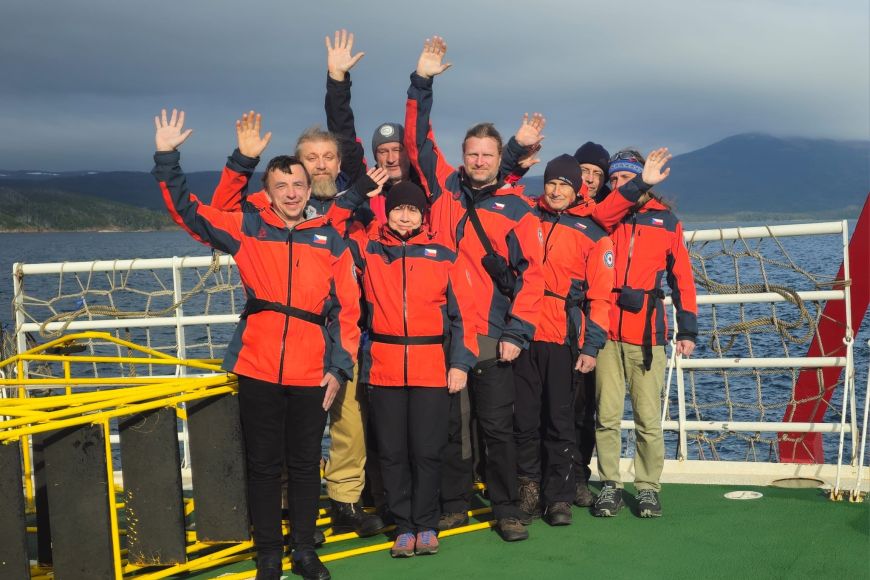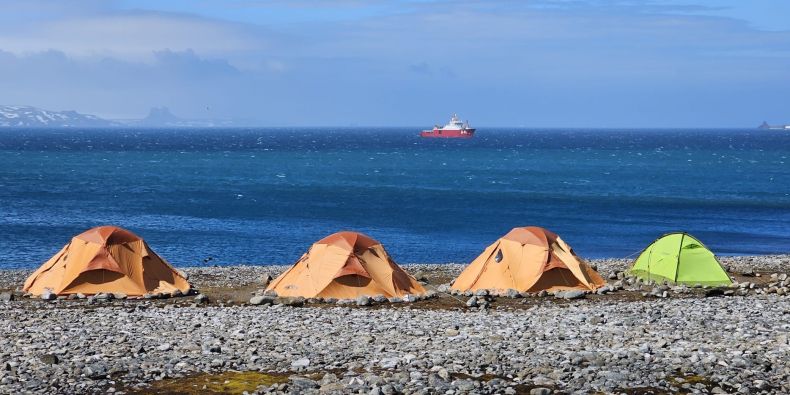The first part of the expedition, consisting of eight people, left the Czech Republic on 27 December and arrived safely at the CZ*ECO Nelson base in the first week of January. This smaller expedition will last six weeks in total, of which almost four weeks will be spent working on King George Island and Nelson Island. At the end of this part of the expedition, two participants will travel to the Ukrainian station Vernadsky on Galindez Island to continue working on the joint Czech-Ukrainian research project, and will return to Europe in early May.
The main group will fly from Vienna Airport via Madrid to Chile next week, where they will board the Chilean Navy ship Sargento Aldea, which will take them through the Drake Passage to Antarctica. They will then travel on board the Janequeo to the Mendel Polar Station on James Ross Island. This part of the expedition consists of nine researchers (two of them women, one of them from Charles University), one doctor, four technicians and a two-member film crew consisting of Petr Horký, a traveller and documentary filmmaker, as well as an experienced polar explorer who has made expeditions to the three poles of the Earth (North, South and the Cold Pole), and Jan Šimánek, a cameraman. They will be shooting a unique documentary about the Czech Antarctic Research Programme for Czech Television.
“This is a tremendous opportunity to show the general public how far our programme has come in the twenty years of its existence, and in the most attractive possible form of a professional film documentary made by the most competent filmmakers,” said Daniel Nývlt, head of the Czech Antarctic Research Programme at the Department of Geography at the Faculty of Science.
In addition to filming the documentary, the expedition will conduct research and test new equipment and instruments. The scientific objectives of this year’s expedition primarily include long-term climate monitoring and comprehensive monitoring of the state of polar geology and ecology, i.e. the local glaciers, permafrost, deforested areas that allow shrubs to grow, river and lake systems and other geomorphological formations.
“The five-year JUNIOR STAR project, which focuses on studying changes in the permafrost on the Antarctic Peninsula, will continue, as will medical research into the effects of stress on the health of workers in polar regions, which is being conducted in cooperation with the University Hospital in Ostrava and the Faculty of Sports Studies and the Academy of Sciences of the Czech Republic,” said expedition leader Peter Váczi from the Department of Geography and the Department of Experimental Biology at the Faculty of Science. As part of the A.D.A.P.T. project, scientists from the Department of Anthropology will also study how the expedition participants’ bodies change during the expedition. The anthropologists have collected information on the polar explorers’ body measurements before they left and will compare these with measurements taken on their return. The data collected will be used to optimise the equipment and clothing tested in Antarctica.

The 20th Masaryk University expedition to the Antarctic will be made up of 24 participants. Some members of the expedition have already arrived at the CZ*ECO Nelson base on Nelson Island, while the main part of the expedition team will leave on Wednesday 24 January for the Mendel Polar Station on James Ross Island, where they will spend two months.
“Among the participants of our international expedition will be two Slovak colleagues who are graduates and employees of Masaryk University, as well as two researchers from Ukraine,” said Pavel Kapler, head of the Czech Antarctic Research Programme, which is based at the Department of Geography of the Faculty of Science. The first part of the expedition is likely to face some complications during its stay. “According to reports from the Council of Managers of Antarctic National Programmes (COMNAP), a highly pathogenic avian influenza virus (HPAI) may appear in the area, which will limit some of our planned activities and completely prevent the possibility of conducting research on animals,” Kapler added.
Within the framework of the cooperation of the Czech Antarctic Research Programme with the industry and application sphere, the testing of COMET SYSTEM’s auxiliary equipment for the automatic meteorological station will continue during this year’s expedition. New tests will be carried out on the safety elements of the equipment manufactured by SCILIF (SUNFIBRE active luminous fibre technology) and Northman outdoor socks from Bruntál, as these companies are applying for a licence to use the trademark Tested in Antarctica.
The Mendel Polar Station, owned and operated by Masaryk University, was completed on 4 March 2006. It was inaugurated and handed over to researchers for use on 22 February 2007. The second base, formerly known as Eco-Nelson, is located on Nelson Island in the South Shetland archipelago, and now serves as a technical and logistical centre under the name CZ*ECO Nelson as part of the research programme infrastructure. The building was acquired from a private owner, the Czech Antarctic Foundation, which leased it to Masaryk University for 99 years in 2018.
